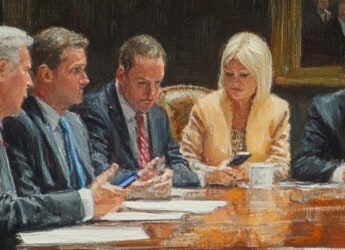Editor’s Note: The ongoing legal battle over Kroger’s proposed $25 billion acquisition of Albertsons has captured the attention of industry professionals and consumers alike, marking a potentially transformative moment for the U.S. grocery sector. As the largest supermarket merger in American history, this case is more than just a business transaction—it’s a high-stakes conflict that pits the Federal Trade Commission’s concerns about competition and consumer welfare against Kroger’s ambitions to enhance its competitive standing against retail giants. For those in cybersecurity, information governance, and eDiscovery, the implications of this case extend beyond the immediate financial and operational consequences. The legal precedents set here could influence the regulatory environment, data management practices, and competitive strategies in related sectors.
Content Assessment: High-Stakes Legal Battle: Potential Impacts of the Kroger-Albertsons Merger
Information - 92%
Insight - 94%
Relevance - 92%
Objectivity - 90%
Authority - 88%
91%
Excellent
A short percentage-based assessment of the qualitative benefit expressed as a percentage of positive reception of the recent article from ComplexDiscovery OÜ titled, "High-Stakes Legal Battle: Potential Impacts of the Kroger-Albertsons Merger."
Industry News – Antitrust Beat
High-Stakes Legal Battle: Potential Impacts of the Kroger-Albertsons Merger
ComplexDiscovery Staff
The ongoing legal battle surrounding Kroger’s proposed $25 billion acquisition of Albertsons is drawing significant attention due to its potential impact on the grocery sector in the United States. This merger, if allowed, would constitute the largest supermarket merger in U.S. history. The Federal Trade Commission (FTC) has strongly opposed the merger, arguing that it would stifle competition, lead to higher prices for consumers, and diminish the bargaining power of grocery workers. On the other hand, Kroger contends that the merger would enhance their ability to compete with retail giants like Walmart, Costco, and Amazon while promising lower prices and better deals for consumers.
The FTC has requested a preliminary injunction from the U.S. District Court while it seeks to block the merger through an administrative hearing. During the opening arguments, Kroger’s attorney, Matthew Wolf of Arnold & Porter, emphasized the urgency of preventing an injunction, claiming that the deal’s financing and necessary operational licenses would expire during the lengthy FTC proceedings. He argued that the merger would immediately lower prices at Albertsons stores, which he claimed are currently up to 12% higher than Kroger’s prices. Albertsons’ attorney, Enu Mainigi of Williams & Connolly, highlighted the potential negative consequences of the merger’s failure, including store closures, layoffs, and the necessity of selling the company to another buyer.
FTC’s chief trial counsel, Susan Musser, presented a counter-argument, stating that the merger would eliminate critical competition, which consumers and workers rely on. She underscored the high stakes involved, noting that the merged entity would control a substantial portion of the market, operating over 5,000 stores and employing over 700,000 workers. Musser argued that blocking the merger is essential to maintaining competitive prices and quality services for consumers.
The hearing is being presided over by Judge Adrienne Nelson, who will determine the outcome of the FTC’s request for a preliminary injunction. This decision is expected to play a pivotal role in the final determination of the merger’s fate. Both sides have presented compelling arguments, with Kroger stressing the competitive pressures from retail behemoths and the FTC cautioning against the potential for monopolistic dominance and higher consumer prices.
Kroger has also proceeded to sue the FTC, arguing that the agency’s administrative proceedings are unconstitutional and should be resolved in federal court. This lawsuit reflects the intensity of the legal battle, as Kroger seeks to expedite the approval process and avoid the protracted FTC hearings. The company has pledged to reduce grocery prices by $1 billion as part of the merger proposal, doubling its previous commitment from earlier this year.
Market analysts and industry experts remain divided on the potential impact of the merger. Some, like David Smith from Pepperdine University’s Graziadio Business School, suggest that the merger’s effects will vary depending on regional market conditions and the actions of the merged entity. Others, such as Holmes Osborne of Osborne Global Investments, Inc., believe the consolidation could lead to layoffs but ultimately benefit consumers by enabling the combined company to better compete with dominant players like Walmart and Costco.
The trial has brought national attention to Portland, Oregon, where the proceedings are taking place. The FTC has urged the court to focus on specific regional impacts, pointing to cities like Corvallis, where a combined Kroger-Albertsons entity would control a significant market share. The outcome of this high-stakes legal battle will set a precedent for future mergers in the grocery sector and could have far-reaching implications for consumers, employees, and the industry’s competitive landscape.
News Sources
- Kroger-Albertsons merger hearing gets underway with Oregon center stage
- Kroger sues FTC over holdup of Albertsons grocery merger
- FTC and Kroger clash over Albertsons merger and grocery prices
- Inside the Battle Over Kroger and Albertsons Merger
- Kroger and FTC square off in U.S. court over Albertsons merger
Assisted by GAI and LLM Technologies
Additional Reading
- Antitrust Lawsuit Against RealPage Raises Concerns Over AI-Driven Collusion
- FBI Ramps Up Antitrust Investigation into Housing Market, Focusing on RealPage Algorithm
Source: ComplexDiscovery OÜ


























